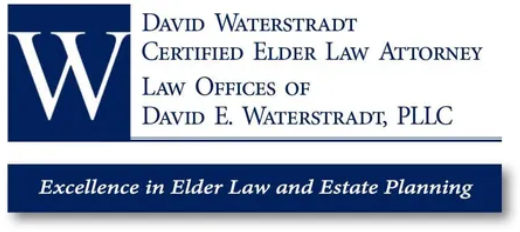950 W Norton Ave Ste 405 Muskegon, MI 49441
Medicaid Planning Attorney in Muskegon, MI
Over 30 Years of Experience in Medicaid Law in West Michigan!
David Waterstradt helps clients with Medicaid planning in Muskegon, Ludington, Whitehall, Grand Haven, and anywhere in the Western Michigan area.
How Can You Protect Assets And Still Become Medicaid Eligible?
The number one question from people who need to get a loved one eligible for Medicaid is: How can we keep or protect assets? Fortunately, if you do some careful planning there are a few legal ways to increase the assets that an applicant can keep. The planning method that is best for you may depend on whether you are single or married.
Medicaid Planning FAQs
What assets can you keep regardless of marital status?
The Medicaid laws that apply to a single person are different than the Medicaid laws that apply to a married person. However, there are some laws that apply to both a single person and a married person. Regardless of whether you are single or married, generally speaking, you can become Medicaid eligible and keep the following assets: your home, one vehicle, personal belongings, a prepaid irrevocable funeral contract, life insurance with a combined face value of $1,500 or less and up to $9,660 of cash or other countable assets. These are known as “exempt assets”. Your other assets (“non-exempt assets”) have to be “spent down” before you can become Medicaid eligible. To determine how best to maximize your assets, the first thing to look at is whether you own exempt assets, and if not, whether it makes sense to convert non-exempt assets into exempt assets. For example, do you have a prepaid irrevocable funeral contract? If not, we generally recommend that you use non-exempt cash to purchase one. As another example, we discuss the condition of your home. Does it need a new roof? Does it need a new furnace? If so, we generally recommend that you use some of your non-exempt assets to purchase those items for the home so that the value of the home is increased.
What additional assets can you keep if you are married?
If you are married, Michigan law provides that a spouse who continues to live at home, known as the “community spouse,” may keep additional assets that equal one-half on your non-exempt assets (sometimes referred to as your “countable Assets”) up to a maximum of $157,920 (this is the amount for 2025; however this amount changes annually). The great news is that we can help you keep the balance of your assets that exceed the amount that Michigan law allows the community spouse to keep. We do this by using either a Medicaid compliant annuity or a sole benefit trust.
In the case of an annuity, excess assets are transferred to be the community spouse who uses them to purchase an irrevocable immediate annuity from a life insurance company. The insurance company pays the assets back to the community spouse in equal monthly payments over a period that is equal to or less than the life expectancy of the community spouse.
In the case a sole benefit trust, a trust is created for the sole benefit of the community spouse. Payments have to be made out of the trust to community spouse on at least an annual basis in an actuarially sound basis, i.e. at a rate that will distribute all the assets during the community spouses life expectancy. DHHS has turned to prohibit the use of sole benefit trusts but litigation has confirmed that the remain a viable planning alternative. Who legally obligate themselves to pay the assets back to the community spouse in the equal monthly payments over a defined term. The promissory note has to be irrevocable and cannot be forgiven or cancelled. If the excess assets consist of cash a commercial annuity is preferable because it eliminates the possibility of family members failing to make required payments from overnight, bankruptcy, divorce or other reasons. However, to hold the excess assets that are difficult. To turn into cash, such as real estate other than the home, a promissory note might be preferable.
What additional assets can you keep if you are single?
If you are a single person who needs to become Medicaid eligible, you are faced with a dilemma: You can keep your home, but only have $9,660 to maintain your home. Where does the money come from to pay the property taxes, the home owners’ insurance, the utilities, etc?
Fortunately, there is a way that you can gift approximately 50% of your non-exempt assets and still become Medicaid eligible. This is accomplished with a “short term” Medicaid compliant annuity.
In simple terms, you can give away approximately one-half of your non-exempt assets, and use the other half to put into a Medicaid compliant annuity. The gift will trigger a Medicaid ineligibility period. The term of the annuity has to be carefully calibrated to match this period of ineligibility to give the Medicaid applicant sufficient income (when combined with social security, pensions and any other regular income) to pay the cost of the applicant’s nursing home care. Once the annuity is fully paid out, then the applicant is Medicaid eligible. The approximately 50% that is gifted can then be used to cover the costs of maintaining the home, to pay expenses not covered by Medicaid, or eventually kept by the heirs.
Long Term Care Asset Protection Planning for a Healthy Person
If your need for nursing home care is not imminent, it’s possible to set up a trust that may allow you to protect even more assets. For example, an irrevocable trust can be set up with your children as beneficiaries. It may be possible for you to remain as the “income beneficiary” of the trust. Once assets are transferred to the trust, if 5 years pass without the need to apply for Medicaid to cover long term care costs, the assets in the trust will no longer be considered by Medicaid. For married couples, it is possible to establish a testamentary trust for the benefit of your spouse in the estate plan that will protect assets for the surviving spouse without triggering the 5 year look back period.
Why Choose Us?
Medicaid planning is a critical aspect of preparing for the future, especially in light of rising healthcare costs and the complexities of long-term care. The Law Office of David E. Waterstradt specializes in crafting personalized strategies that safeguard your assets while ensuring compliance with Medicaid regulations. From strategic asset transfers and income planning to navigating Medicaid's intricate rules, David E. Waterstradt provides clear, insightful counsel tailored to your unique financial situation.
We understand the emotional and financial challenges that accompany elder care planning. With empathy and professionalism, we guide clients through every step of the Medicaid planning process, offering comprehensive solutions that prioritize your financial security and well-being.
At The Law Office of David E. Waterstradt, our commitment to excellence is evident in our meticulous approach to Medicaid planning. We stay abreast of legal developments and leverage our deep understanding of elder law to provide informed guidance and effective solutions. Whether you are proactively planning for future care needs or facing an immediate Medicaid crisis, we are dedicated to achieving favorable outcomes and empowering you with peace of mind.
Beyond our legal expertise, we prioritize building trusting relationships with our clients. We listen attentively to your concerns, provide clear explanations of your options, and work diligently to achieve your goals. Our goal is to empower you with the knowledge and tools needed to make informed decisions about your Medicaid planning needs.
At The Law Office of David E. Waterstradt, serving Muskegon, MI area, our expert guidance meets compassionate advocacy in the realm of Medicaid planning and elder law. As a distinguished Medicaid planning attorney, David E. Waterstradt leverages over 30 years of experience to help individuals and families navigate the intricate landscape of Medicaid eligibility and asset protection.
Navigation
Contact Info
Tel:
231-773-1169
Fax: 231-773-1179
950 W Norton Ave Ste 405 Muskegon, MI 49441
- Mon - Fri
- -
- Saturday
- Appointment Only
- Sunday
- Closed
Get In Touch
Contact Us
We will get back to you as soon as possible.
Please try again later.

